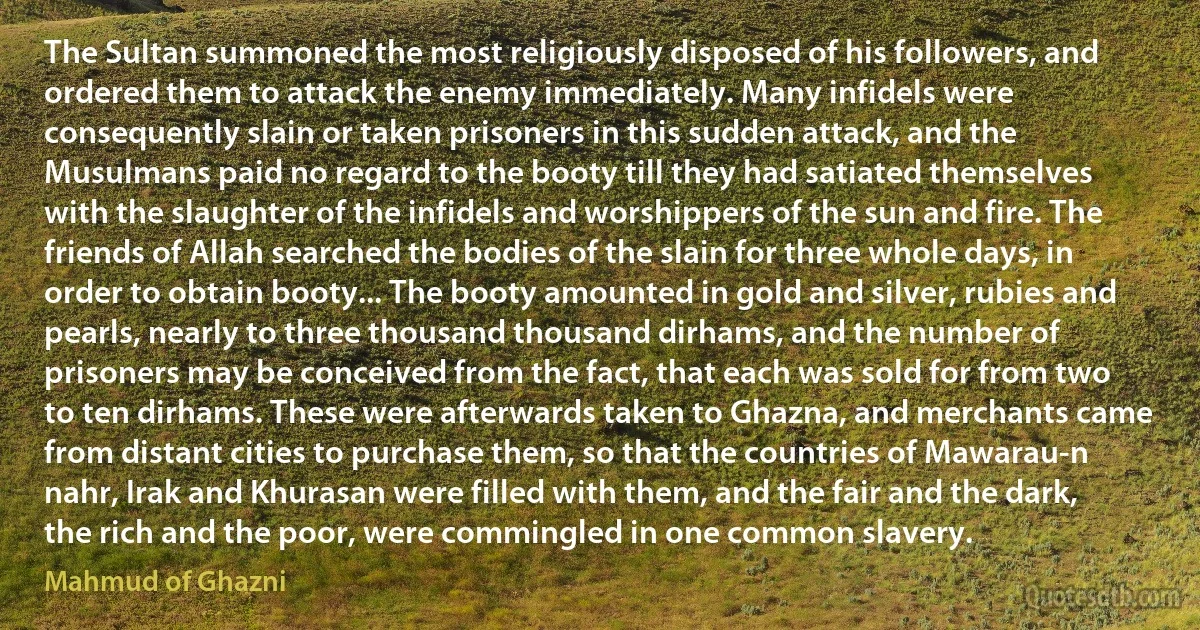Slain Quotes - page 4
'And victory the beautiful woman (shahid) whose world-adornment of waving tresses was embellished by Allah will aid you with a mighty aid, bestowed on us the good fortune that had been hidden behind a veil, and made it a reality. The absurd (batil) Hindus, knowing their position perilous, dispersed like carded wool before the wind, and like moths scattered abroad. Many fell dead on the field of battle; others, desisting from fighting, fled to the desert exile and became the food of crows and kites. Mounds were made of the bodies of the slain, pillars of their heads.

Babur
All these trod the road to Hell, removing from this house of clay to the pit of perdition. The enemy's country was full, as Hell is full, of wounded who had died on the road. The lowest pit was gorged with miscreants who had surrendered their souls to the lord of Hell. In whatever direction one from the army of Islam hastened, he found everywhere a self-willed one dead; whatever march the illustrious camp made in the wake of the fugitives, it found no foot-space without its prostrate foe. All the Hindus slain, abject and mean, By matchlock-stones, like the Elephants' lords, Many hills of their bodies were seen, And from each hill a fount of running blood.

Babur
I have no health for a soldier, and as I have no expectation of serving my country in that way, I am spending my time in the old trifling manner, and am so taken with optics, that I do not know whether, if the enemy should invade this part of the country, as Archimedes was slain while making geometrical figures on the sand, so I should die making a telescope.

David Rittenhouse
Here you should be guided by the words of St. Paul, I Corinthians 7 [:4–5], "The husband does not rule over his own body, but the wife does; likewise the wife does not rule over her own body, but the husband does. Do not deprive each other, except by agreement,” etc. Notice that St. Paul forbids either party to deprive the other, for by the marriage vow each submits his body to the other in conjugal duty. When one resists the other and refuses the conjugal duty she is robbing the other of the body she had bestowed upon him. This is really contrary to marriage, and dissolves the marriage. For this reason the civil government must compel the wife, or put her to death. If the government fails to act, the husband must reason that his wife has been stolen away and slain by robbers; he must seek another. We would certainly have to accept it if someone's life were taken from him. Why then should we not also accept it if a wife steals herself away from her husband, or is stolen away by others?

Martin Luther
So long as man remains free he strives for nothing so incessantly and so painfully as to find someone to worship. But man seeks to worship what is established beyond dispute, so that all men would agree at once to worship it. For these pitiful creatures are concerned not only to find what one or the other can worship, but to find community of worship is the chief misery of every man individually and of all humanity from the beginning of time. For the sake of common worship they've slain each other with the sword. They have set up gods and challenged one another, ‘Put away your gods and come and worship ours, or we will kill you and your gods!' And so it will be to the end of the world, even when gods disappear from the earth; they will fall down before idols just the same.

Fyodor Dostoyevsky
Qutb-ud-Din, whose reputation for destroying temples was almost as great as that of Muhammad, in the latter part of the twelfth century and early years of the thirteenth, must have frequently resorted to force as an incentive to conversion. One instance may be noted: when he approached Koil (Aligarh) in A. D. 1194, ' those of the garrison who were wise and acute were converted to Islam, but the others were slain with the sword.

Qutb al-Din Aibak
Somnat - A celebrated city of India, is situated on the shores of the sea, and washed by its waves. Among the wonders of that place was the temple in which was placed the idol called Somnat' When the Sultan Yaminu-d Daula Mahmud bin Subuktigin went to wage religious war against India, he made great efforts to capture and destroy Somnat, in the hope that Hindus would become Muhammadans. He arrived there in the middle of Zil K'ada AH 416 (December AD 1025). The Indians made a desperate resistance' The number of slain exceeded 50,000.

Mahmud of Ghazni
When the honoured month of Ramazdn, 588 H., the season of mercy and pardon, arrived, fresh intelligence was received at the auspicious Court, that the accursed Jatwan, having admitted the pride of Satan into his brain, and placed the cup of chieftainship and obstinacy upon his head, had raised his hand in fight against Nusratu-d din... The armies attacked each other "like two hills of steel, and the field of battle became tulip-dyed with the blood of the warriors."... The Hindus were completely defeated, and their leader slain." Jatwan, who was the essence of vice and turbulence, and the rod of infidelity and perverseness, the friend of grief, and the con- panion of shame, had his standards of God-plurality and ensigns of perdition lowered by the hand of power;" "and the dust of the field of battle was commingled with the blood of that God- abandoned wretch, and the whole country was washed from the filth of his idolatry.'"

Muhammad of Ghor
In the middle of the month of Safar, 593 H. (Jan. 1197), the world-conquering Khusru departed from Ajmir, and with every description of force turned his face towards the annihilation of the Rai of Nahrwala.... A severe action ensued from dawn to mid-day when 'the army of idolatry and damnation turned its back in flight from the line of battle. Most of their leaders were taken prisoners, and nearly fifty thousand infidels were despatched to hell by the sword, and from the heaps of the slain, the hills and the plains became of one level... More than twenty thousand slaves, and twenty elephants, and cattle and arms beyond all calculation, fell into the hands of victors.

Muhammad of Ghor
O illustrious Kshattri, Bhimasena is missing! Where has he gone? The other brothers have all come back from the gardens, only Bhima of mighty arms does not come home! Duryodhana likes him not. The w:KauravaKaurava is crooked and malicious and low-minded and imprudent. He coveteth the throne openly. I am afraid he may have in a fit of anger slain my darling. This afflicts me sorely, indeed, it burns my heart.

Kunti
Abstain rigorously from eating the flesh of cows and all beneficent animals, lest you be made to face a strict reckoning in this world and the next; for by eating the flesh of cows and other domestic animals, you involve your hand in sin, and thereby think, speak, and do what is sinful; for though you may eat but a mouthful, you involve your hand in sin, and though a camel be slain by another person in another place, it is as if you who eat its flesh had slain it with your own hand.

Adurbad-i Mahrspandan
When Sultan Alau-d din, the Sultan of Delhi, was well established in the centre of his dominion and had cut off the heads of his enemies and slain them, the vein of the zeal of religion beat high for the subjection of infidelity and destruction of idols, and in the month of Zi'l-hijja 698 H. (1298 AD) his brother Malik Mu'izzu-d din and Nusrat Khan, the chief pillar of the state and the leader of his armies, a generous and intelligent warrior, were sent to Kambayat, the most celebrated of the cities of Hind in population and wealth' With a view of holy war, and not for the lust of conquest...

Alauddin Khalji
Mahomed Shah now sat down before Condapilly and Bhim Raj, after six months, being much distressed, sued for pardon; which being granted, at the intercession of some of the nobility, he surrendered the fort and town to the royal troops. The King having gone to view the fort, broke down an idolatrous temple, and killed some bramins, who officiated at it, with his own hands, as a point of religion. He then gave orders for a mosque to be erected on the foundation of the temple, and ascending a pulpit, repeated a few prayers, distributed alms, and commanded the Khootba to be read in his name. Khwaja Mahmood Gawan now represented, that as his Majesty had slain some infidels with his own hands, he might fairly assume the title of Ghazy, an appellation of which he was very proud. Mahmood Shah was the first of his race who had slain a bramin...

Firishta
Ahmud Shah, without waiting to besiege the Hindoo capital, overran the open country; and wherever he went put to death men, women, and children, without mercy, contrary to the compact made between his uncle and predecessor, Mahomed Shah, and the Rays of Beejanuggur. Whenever the number of slain amounted to twenty thousand, he halted three days, and made a festival celebration of the bloody event. He broke down, also, the idolatrous temples, and destroyed the colleges of the bramins. During these operations, a body of five thousand Hindoos, urged by desperation at the destruction of their religious buildings, and at the insults offered to their deities, united in taking an oath to sacrifice their lives in an attempt to kill the King, as the author of all their sufferings...

Firishta
The Ambassador [of Tripoli] answered us that it was founded on the Laws of their Prophet, that it was written in their Koran, that all nations who should not have acknowledged their authority were sinners, that it was their right and duty to make war upon them wherever they could be found, and to make slaves of all they could take as Prisoners, and that every Musselman who should be slain in battle was sure to go to Paradise.

Thomas Jefferson



